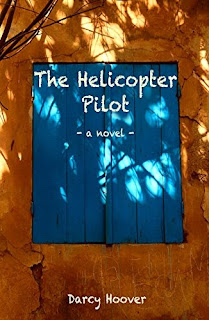The Helicopter Pilot- Darcy Hoover
There was a brief period at the start when I thought that
there was going to be rather too much engineering talk about helicopters, but
this soon passed. Then very soon I was being drawn into the real story, the one
about the characters that pilot those machines, and particularly the
sub-culture of well-travelled pilots that ply their trade wherever it is called
for. The story centres on a group of pilots working a fictitious site of oil
drilling platforms of the coast of East Africa.
As the story begins to generate pace, we soon realise that
its main theme is a clash between wealthy, privileged Western and a strong
African culture that manage to sustain its people despite appalling relative
poverty. The central figure, a form-filling, technically efficient if less than
naturally talented, pilot is both naïve and prejudiced in his attitudes to
foreigners in general, and especially those that live under African skies. He
isn’t racist, that would be an unfair slur, but he certainly lives his
bottled-up life under a thick blanket of cultural prejudices and unsound
expectations. However, the mix of skin-hardened bush, ex-military and worldly-wise
commercial pilots ensure that Edward sees his African contract through, if only
just. We see Edward not so much change his spots, but to at least give them a
depth of human understanding, that even in our widely wired, and increasingly
educated population is far from always associated with first-world experience;
even when burnished with occasional bursts of sunburnt crimson in one protected
tourist enclave or another.
This is a well written first book by a more than competent independent
writer, who brings a good deal of personal experience to this entertaining
story. However, a
professional copy edit would certainly improve the read.
It is, in the end, a book about the human condition, about the ability of people to make the best of what they have, wherever they happen to be, and about the prejudices in our variable characters that define us all, that make us the individuals we are. Edward would end up utterly the same man and yet profoundly changed by a few weeks in a much larger world; a place less tailored to his comfy, safe, preconceptions.
It is, in the end, a book about the human condition, about the ability of people to make the best of what they have, wherever they happen to be, and about the prejudices in our variable characters that define us all, that make us the individuals we are. Edward would end up utterly the same man and yet profoundly changed by a few weeks in a much larger world; a place less tailored to his comfy, safe, preconceptions.




Commentaires
Enregistrer un commentaire